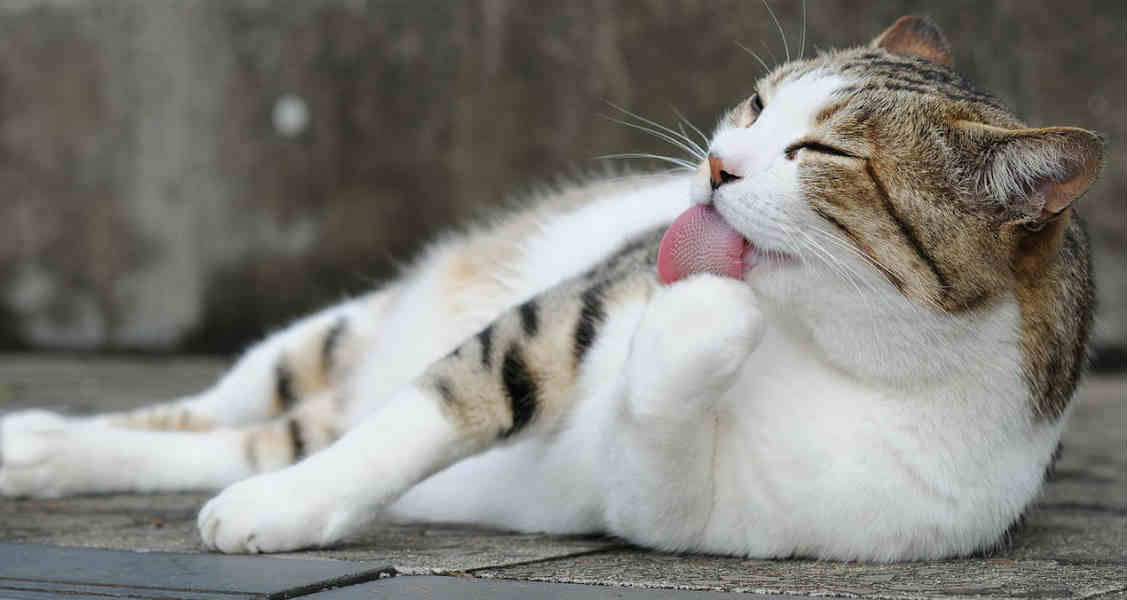The Hairy Truth About Hairballs
By: Dr. Ryan Llera, B.Sc., DVM | Sep 7, 2018

Horf horf horf, ack! Ah yes, the sound you might hear at 3 am and don’t make the connection until you wake up in the morning and step in it. You know, the cold wet clump of fur your cat brought up a few hours ago. For some cats and their owners, it has just been written off as a part of life. But for others though, hairballs might be a sign of a larger problem.
In many cases, we can point the finger of blame to evolution whereby we got the joy of long-haired cats on Earth and later we can thank the Egyptians thousands of years ago for worshipping these glorious felines. From those days on, cats decided to make us their servants and remind us of our place… What better way to do this than to make us clean up their recycled hair in a wet, clumped format? It’s not just long-haired cats that provide us with hairballs however as my own domestic shorthair Gremlin almost daily now reminds me with a small gift on my side of the bed. (It turns out, she was actually constipated and once that was addressed the hairballs stopped!).
Causes of Hairballs
Hairballs, or trichobezoars, in most cases are the product of grooming as part of kitty’s normal cleaning habits. Typically, they might only have an episode every few weeks to months and this is not so problematic. Brushing your cat (if they’ll let you!) can help remove dead hairs and minimize how much they are ingesting. For cats that aren’t amenable to brushing or if it still isn’t enough, many veterinarians will recommend using a gooey flavored paste (Laxatone or Tonic-Lax are 2 common products) that can help bind up hairs and grease up the insides a bit to help them pass more easily out the back end.
Sometimes though, hairballs are much more frequent than expected. But why? Over-grooming can be a common cause but is often linked to other issues. Cats may over-groom if they are stressed for behavioral reasons. Another cause is underlying skin issues such as allergies or infections. I’ve even seen a few cats lick their bellies clean of fur and they were found to have problems on the inside such as bladder infections or stones and in one case an intestinal tumor. The most likely thought is the inflammation was so uncomfortable that the licking was almost as if they were trying to relieve the discomfort on the inside. But then again, they can’t talk to us so maybe their obsessive behaviors in those cases were them telling us there was a problem.
Another cause to consider would be gastrointestinal issues. We know cats eat their own hair, and who wouldn’t like silky smooth hair? That hair may sit in the stomach for a prolonged time if there is a motility issue such as delayed emptying of the stomach or an excessive amount of tissue that prevents things from passing into the intestine. On occasion, these clumps of hair can join with other ingested material and cause an obstruction which might involve surgery to remove.
What Can You Do
To help with these issues, your veterinarian may recommend a hairball control diet which has certain amounts of digestible fibre to stimulate intestinal movement or, if needed, medications can also be used to help keep a normal flow. If there is an increased frequency of hairballs, it may often be linked to inflammatory bowel disease.
When to Be Concerned
As I try to tell people, a one time incident in these cases isn’t usually a cause for alarm. Multiple times or increasing frequency deserves a trip to your trusted veterinarian. So next time you step in a hairball, maybe your cat is trying to tell you something and you should listen. Or they’re just getting revenge for that horrible outfit you made them wear at Halloween.


Disclaimer: healthcareforpets.com and its team of veterinarians and clinicians do not endorse any products, services, or recommended advice. All advice presented by our veterinarians, clinicians, tools, resources, etc is not meant to replace a regular physical exam and consultation with your primary veterinarian or other clinicians. We always encourage you to seek medical advice from your regular veterinarian.

